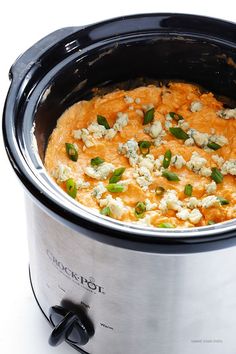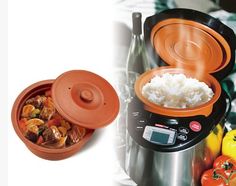What Causes Slow Cookers to Crack?

Technology has become such an integral part of people’s lives in modern times that it can be found in almost every household on a large scale.
It has proven to be a lifesaver for many in our hectic lives. It has simplified many of our everyday activities.
The kitchen is no exception to this rule.
Today, we’ll discuss one such electrical appliance that may be utilized in the kitchen to make cooking a lot easier.
Slow Cookers are the name of the kitchen equipment/appliance in question.
I’ve used slow cookers on numerous occasions and have never had an issue leaving them overnight or while at work.
However, I’ve recently heard many complaints about slow cookers cracking, which prompted me to study the subject further.
This investigation led me to conclude that a slow cooker might shatter for one of three causes.
So, in this essay, I’ll explain in depth why Slow Cookers may crack by answering the topic, “Why Do Slow Cookers Crack?”
What are the most common causes of crackers in slow cookers?
This is where we start looking into the reasons for the cracking of cookers in greater depth.
Submerging a hot slow cooker in cold water makes it more prone to crack.
For instance, as we remove the food from the Crock-pot, we are likely to immediately fill it with water so that nothing sticks to the cooker’s interior.
If the water was not cold enough, doing this while the ceramic insert was still hot could result in the slow cooker shattering.
Another cause of cracking is putting too much stress on the ceramic insert when it is placed on a hard surface. These cracks may not be evident when they first appear, but they will undoubtedly break apart the next time the slow cooker is used.
Crock-Pot also suggests filling your slow cooker at least a third of the way whole.
It’s also a good idea to have some liquid in the slow cooker to avoid burning your meal. It would also keep the food from drying out; thus, it should be added unless the dish already has high moisture and fat content.
However, if left on for too long, it may crack.
Finally, suppose you use the slow cookers to reheat food that has just been taken out of the refrigerator and is still very cold. In that case, the slow cookers are more prone to shatter.
As a result, it is usually recommended to allow the meal to come to room temperature before reheating it.
It brings us to the end of our list of factors that could cause slow cookers to fracture. Let’s take a look at some of the other components of this slow cooker craze.
Is it possible to repair a cracked Crock-pot or slow cooker?

My firm opinion is that this is not a good idea.
This is because gluing the crack is likely to jeopardize food security.
Furthermore, the repair may not be able to withstand the heat for an extended period.
So, given the low cost of Crock-Pots on the market, I would advise against attempting to fix the slow cooker and use it.
Let’s look at some more frequently asked questions about slow cookers.
Is it safe to leave the slow cooker turned on all night?
Many people have slow cookers in their homes, but many aren’t sure how to use them.
The most frequently asked question is if these cookers can be left ‘on’ for an extended amount of time.
Assuming that the answer to this question is yes, you can certainly do so.
These cookers are constructed in such a way that they may be left ‘on’ for an extended amount of time.
However, this does not rule out the possibility that negligence, such as using the improper combination of ingredients, can cause the dish to scorch on the bottom of the spatter on the counter. In general, though, leaving the slow cooker ‘on’ at night is very safe.
Just make sure it’s kept 6 inches away from the walls and that the cable isn’t near the sink or other liquids.
Is it safe to leave a slow cooker running while you’re at work?
You can leave this cooker ‘on’ while at work, just as you may keep it ‘on’ at night. Ideally, I would recommend setting it to low, which is the setting that is typically used for 8 hours or more.
Also, make sure your Crock-Pot is on a heat-resistant surface, such as granite countertops, and that the surface is flat to prevent the food from falling and spilling.
Is it possible to keep a slow cooker heated for the entire day?
Most Crock-Pots and other slow cooker manufacturers have a warm setting that keeps your temperature constant.
As a result, you should be aware that these cookers are not intended for the purpose of heating food.
So make sure your food is cooked correctly before setting it on warm for the rest of the day.
For example, if you have been cooking a brisket all night and want to eat it for dinner, you can put it in a warm setting before going to work.
Just make sure there’s plenty of sauce in it, and it’ll stay warm all day.
Is it possible to use a Pyrex dish in a slow cooker?
Surprisingly, I discovered that the answer was Yes.
Stephanie O’Dea, author of the New York Times best-selling slow-cooker cookbook, verifies this.
Combine your ingredients in a small oven-safe glass baking dish or Pyrex-style container and place it in the slow cooker.
Now, the oven is yet another kitchen device that is widely utilized. Let’s look at some of the questions that have been raised in relation to slow cookers.
Is it possible to bake a slow cooker dish?
The answer to this question is yes.
Almost all slow cooker brands are microwave, oven, and dishwasher safe. However, it is strongly advised that you do not use them on a stovetop or over an open flame of any type because heating a slow cooker on a stovetop can cause slow cookers to break.
However, it’s always a good idea to double-check with the manufacturer before purchasing a slow cooker.
Is it true that slow cookers are toxic?

A 2004 investigation by Bill Gebhardt of KUTV in Salt Lake City brought this worry concerning slow cookers to light.
He was looking into the possibility of lead contamination of the meal due to its leaching once the pot heated up. He discovered that roughly 20% of the slow cookers were leaking minor amounts of lead into the cooking food.
When ceramic vessels are heated to 80 degrees Fahrenheit, they emit ten times the lead they do when left unheated.
He thought it was worth examining because slow cookers heat temperatures above 250°.
When acidic foods are heated, they tend to release more lead.
However, nearly all slow cooker brands now say that their products do not include any leaded glaze, even though it has been over 15 years.
They also claim that their slow cooker complies with FDA Compliance Policy, which states that leach levels of 1 mcg/ml are considered acceptable.
The good news is that the FDA keeps track of which products have tested positive for lead, and slow cookers aren’t on it.
Before we wrap up this post, let’s answer the last question about slow cookers.
Is it possible for a slow cooker to catch fire?
No, this is not the case.
At the very least, not if your slow cooker is in good operating order.
Everything electronic has the potential to catch fire in unusual circumstances. It could be due to a faulty plug, damaged wiring, or a piece of malfunctioning equipment.
However, suppose your slow cooker is in excellent working order with no damaged switches or frayed wires. In that case, it is doubtful to catch fire and would be perfectly fine.
Now, before we wrap up this essay, let’s take a look at everything we’ve discussed thus far.
In this post, we looked at the safety concerns that many Crock-Pot fans have, we went into the specifics of each of those worries.
We investigated and cleared the foggy facts surrounding slow cookers catching fire. In addition, rumors about the Crock-Pots’ toxicity were addressed. Apart from that, we investigated several primary safety concerns, such as whether you can keep your slow cooker ‘on’ while at work or at night.
And we answered the question that we posed at the beginning of the essay, i.e.
What causes slow cookers to crack?
So, now we’re ready to wrap up our article!
Conclusion
We may conclude this article by stating that slow cookers can break for various reasons, including submerging a hot slow cooker in cold water, accidentally hitting it against a hard surface, or using it to reheat cold food rather than room temperature.











